|
|
|
Sort Order |
|
|
|
Items / Page
|
|
|
|
|
|
|
| Srl | Item |
| 1 |
ID:
164157
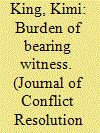

|
|
|
|
|
| Summary/Abstract |
Intersections exist regarding how institutions and individuals respond in the wake of mass violence, and we explore one theoretical perspective: resilience—the ability to overcome in the face of adversity. By controlling for the institutional context, we analyze the microlevel impact of testifying on witnesses who testify. New survey data provide information from 300 prosecution, defence, and Chambers witnesses who appeared at the International Criminal Tribunal for the Former Yugoslavia. We test propositions about resilience related to trauma, motivations, contributions to justice, fair treatment, witness fatigue, and human security. Witnesses who experienced greater trauma, who were more highly motivated, who believed they contributed to justice, and who were satisfied with their current situation were more positive about testifying. Those who believed they were treated fairly by prosecution and defence were less negative. The findings add to the debate about the burden of bearing witness in post-conflict societies and why some overcome adverse experiences related to mass violence.
|
|
|
|
|
|
|
|
|
|
|
|
|
|
|
|
| 2 |
ID:
164163


|
|
|
|
|
| Summary/Abstract |
Do different types of inequality spur violence with different targets? This article explores whom violent movements choose to target when they take to arms, by comparing civil conflicts, which target the state, to communal conflicts, which target other ethnic groups. Different types of ethnic group disadvantage relate to conflict through different mechanisms. Political exclusion is expected to promote the choice to target the central government rather than other ethnic groups, while economic disadvantages should increase the risk of both civil and communal conflicts. The different expectations stem from two important differences between political and economic horizontal inequalities: only the government has the authority to change the political distribution, while there can be many avenues to economic redistribution; and blame is more straightforwardly assigned to the government for political than for economic disadvantages. Statistical analysis of 155 politically relevant ethnic groups in Africa (1991–2009) provides support for both propositions.
|
|
|
|
|
|
|
|
|
|
|
|
|
|
|
|
| 3 |
ID:
164161
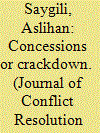

|
|
|
|
|
| Summary/Abstract |
A prominent view in the terrorism literature is that democracies make soft targets for terrorists due to their citizenry’s low tolerance for civilian casualties. This study tests this claim in the context of hostage taking terrorism, which is a unique form of violence that coerces the target state into negotiating over its citizens’ lives under public scrutiny. I argue that democratic accountability generates softer responses to hostage crises only in mature democracies, where leaders’ concern over being held accountable for the human costs of a no-concessions policy outweighs the reputational costs of conceding to terrorists’ demands. Using data on government responses to hostage incidents from 1978 to 2005, I find that regime type becomes a significant predictor of target concessions only at higher levels of regime stability. To test the accountability mechanism proposed by theory, I examine the effect of electoral cycles on target response; as expected, while nearing elections soften democratic responses to hostage crises, in general their positive effect on the likelihood of concessions is stronger in consolidated democracies.
|
|
|
|
|
|
|
|
|
|
|
|
|
|
|
|
| 4 |
ID:
164158
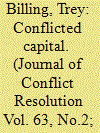

|
|
|
|
|
| Summary/Abstract |
Why do developing countries commit to costly international agreements? Massive arbitral awards and the discovery that rich countries write investment rules have led to a newfound appreciation of the costs of bilateral investment treaties (BITs). Yet, developing countries continue to sign them. This article advances a novel argument for why governments sign potentially costly agreements. We argue that civil conflict changes the decision calculus of governments by rendering them domestically insecure. This insecurity makes governments more willing to sign agreements, like BITs, that sacrifice future policy autonomy. BITs can attract foreign direct investment (FDI) and signal competence, which have important domestic political benefits. BITs are also attractive postconflict since they can be copied quickly from past templates and require few ex ante policy changes. Empirical tests of over 150 countries from 1960 to 2012 demonstrate that governments sign more BITs after civil conflict. Additional tests indicate that postconflict BITs increase FDI inflows, especially after devastating conflict. Our results provide a unique perspective on why governments cede sovereignty to international institutions.
|
|
|
|
|
|
|
|
|
|
|
|
|
|
|
|
| 5 |
ID:
164160
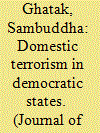

|
|
|
|
|
| Summary/Abstract |
Scholars continue to disagree on the relationship between regime type and political violence, perhaps because the empirical evidence remains contradictory. To date, most studies generally explore the direct relationship between democracy and terrorism. Yet, we think the effect of regime type on terrorism is conditional on the presence of politically excluded groups whose grievances motivate them to challenge the state. We need to take into account both willingness/grievance and opportunity to understand political violence. Using a global data set of domestic terrorism between 1990 and 2012, we find that different regime-associated features of democracy relate differently to domestic terrorism. Higher levels of the rule of law tend to decrease terrorism, whereas electoral democracies tend to experience more domestic terrorism. However, domestic terrorism increases in every form of democracy in the presence of political exclusion. As such, an effective counterterrorism policy must address underlying grievances as democratization by itself may actually drive domestic terrorism up.
|
|
|
|
|
|
|
|
|
|
|
|
|
|
|
|
| 6 |
ID:
164164


|
|
|
|
|
| Summary/Abstract |
This project examines long-term viability of former rebel parties in postconflict elections following negotiated settlements. Building on a growing literature examining the environmental and organizational factors affecting insurgent-to-party transformations and emergence, this project asks why some insurgent organizations remain politically viable as party labels in postsettlement environments while others do not, despite facing similar costs of entry. I propose that revenues from foreign patrons provide political opportunities to desperate rebel groups, easing their transition into viable political parties. However, I also propose that the connection between foreign sponsorship and rebel party development is not ironclad. Utilizing the principal–agent model and the two-level game, this piece argues that the political development of rebel clients may be constrained by the rational and institutional pressures that potential foreign patrons face. Using binary logit models and marginal effects postestimation, this piece finds that rebel parties with authoritarian patrons are more likely to regularly participate in national elections and accumulate governing power.
|
|
|
|
|
|
|
|
|
|
|
|
|
|
|
|
| 7 |
ID:
164156
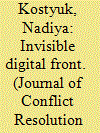

|
|
|
|
|
| Summary/Abstract |
Recent years have seen growing concern over the use of cyber attacks in wartime, but little evidence that these new tools of coercion can change battlefield events. We present the first quantitative analysis of the relationship between cyber activities and physical violence during war. Using new event data from the armed conflict in Ukraine—and additional data from Syria’s civil war—we analyze the dynamics of cyber attacks and find that such activities have had little or no impact on fighting. In Ukraine—one of the first armed conflicts where both sides deployed such tools extensively—cyber activities failed to compel discernible changes in battlefield behavior. Indeed, hackers on both sides have had difficulty responding to battlefield events, much less shaping them. An analysis of conflict dynamics in Syria produces similar results: the timing of cyber actions is independent of fighting on the ground. Our finding—that cyber attacks are not (yet) effective as tools of coercion in war—has potentially significant implications for other armed conflicts with a digital front.
|
|
|
|
|
|
|
|
|
|
|
|
|
|
|
|
| 8 |
ID:
164155
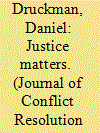

|
|
|
|
|
| Summary/Abstract |
Attaining durable peace (DP) after a civil war has proven to be a major challenge, as many negotiated agreements lapse into violence. How can negotiations to terminate civil wars be conducted and peace agreements formulated to contribute to lasting peace? This question is addressed in this study with a novel data set. Focusing on justice, we assess relationships between process (procedural justice [PJ]) and outcome (distributive justice [DJ]) justice on the one hand and stable agreements (SA) and DP on the other. Analyses of fifty peace agreements, which were reached from 1957 to 2008, showed a path from PJ to DJ to SA to DP: The justice variables were instrumental in enhancing both short- and long-term peace. These variables had a stronger impact on DP than a variety of contextual- and case-related factors. The empirical link between justice and peace has implications for the way that peace negotiations are structured.
|
|
|
|
|
|
|
|
|
|
|
|
|
|
|
|
| 9 |
ID:
164162
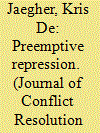

|
|
|
|
|
| Summary/Abstract |
We present a game-theoretic model of the repression–dissent nexus, focusing on preemptive repression. A small group of instigating dissidents triggers a protest if each dissident participates. The dissidents face random checks by security forces, and when an individual dissident is caught while preparing to participate, he or she is prevented from doing so. Each dissident can invest in countermeasures, which make checks ineffective. For large benefits of protest, higher preemptive repression in the form of a higher number of checks has a deterrence effect and makes dissidents less prone to invest in countermeasures, decreasing the probability of protest. For small benefits of protest, higher preemptive repression instead has a backfiring effect. Both myopic and farsighted governments avoid the backfiring effect by setting low levels of preemptive repression (velvet-glove strategy). However, only a farsighted government is able to exploit the deterrence effect by maintaining a high level of preemptive repression (iron-fist strategy).
|
|
|
|
|
|
|
|
|
|
|
|
|
|
|
|
| 10 |
ID:
164159
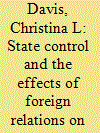

|
|
|
|
|
| Summary/Abstract |
Can governments still use trade to reward and punish partner countries? While World Trade Organization (WTO) rules and the pressures of globalization restrict states’ capacity to manipulate trade policies, politicization of trade is likely to occur where governments intervene in markets. We examine state ownership of firms as one tool of government control. Taking China and India as examples, we use new data on bilateral trade disaggregated by firm ownership type as well as measures of political relations based on bilateral events and United Nations voting data to estimate the effect of political relations on import flows since the early 1990s. Our results support the hypothesis that imports controlled by state-owned enterprises are more responsive to political relations than imports controlled by private enterprises. This finding suggests that politicized import decisions will increase as countries with partially state-controlled economies gain strength in the global economy. Extending our analysis to exports for comparison, we find a similar pattern for Indian but not for Chinese exports and offer potential explanations for these differential findings.
|
|
|
|
|
|
|
|
|
|
|
|
|
|
|
|
|
|
|
|
|